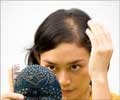If you thought a naked pate would raise your Vitamin D levels, here are the surprising results of a new study – a bald head doesn’t give you an added advantage when it comes to absorbing sunshine’s vitamin D!
While seeking an explanation for why men lose their hair, the scientists, led by University of Auckland's Dr Mark Bolland, conducted the study, which they warned could be skewed by "undisclosed use of hair pieces or 'comb over' techniques."In a bid to explain why older men commonly have higher levels of vitamin D than older women, the researchers recruited 296 middle-aged or older men in the study and rated them according to their hair.
The researchers also took into account skin type and how often they wore a hat or applied sunblock to their scalp.
They observed that nearly half of the study group (48 per cent) had a full head of hair or only "mild" recession, while 15 per cent had "predominant" hair loss and 37 per cent were bald or had "significant" hair loss.
Though there were many variables across the groups, researchers found there was no statistically significant difference in the men's level of vitamin D.
"We conclude that baldness does not appear to have an effect on vitamin D status," The Daily Telegraph quoted the authors as saying.
Advertisement
Also, the researchers claimed that it was possible vitamin D was not produced in the scalp, and that older women had lower vitamin D levels because they had less sun exposure in general and they were more likely to use sunblock.
Advertisement
"All but one of the male authors have a full head of hair," the report disclosed.
The study was published in the Medical Journal of Australia.
Source-ANI
TAN















